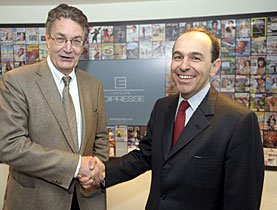Merger to alter media landscape

A planned merger of French- and German-language media groups could help secure their futures, but will also change Switzerland's multimedia landscape, experts say.
Unions warn that hundreds of jobs could be jeopardised.
Zurich-based Tamedia and Edipresse, the leading media group in French-speaking Switzerland, have announced plans for a merger that will create the biggest private media group in Switzerland.
A joint statement said the alliance, to be completed by 2013, aimed to create synergies and ward off foreign competition.
Pierre Lamunière, head of Edipresse, said: “It is not a financial decision but rather the best solution for insuring the long-term survival of our titles.”
He said media globally was going through an “unprecedented changes”. “This alliance is expected to respond to the new structural changes brought about by the development of the Internet and competition from large foreign groups.”
More mergers
A number of observers, including other newspaper editors past and present, agreed that the move was a sound one.
Guy Mettan of the Geneva Press Club described it as a “logical merger economically”, adding that the current global economic crisis was pushing publishers to merge.
Long-time editor and founder of German-language newspapers in Switzerland, Jürg Wildberger, told swissinfo: “These two groups go perfectly well together since, apart from the free newspapers in French-speaking Switzerland, they do not have any common territories and cannot encroach on the territory of one another.”
“This merger is an additional step in the restructuring of the media landscape. There will definitely be others.”
He noted that the pressure on medium- and small-sized editions was now huge.
Tamedia is Switzerland’s fourth-largest media firm and publishes more than 20 regional and local newspapers, including the Zurich Tages-Anzeiger. It also runs radios and television stations as well as online services and has about 1,600 employees.
Edipresse Switzerland is based in Lausanne and has a staff of 3,387. It publishes the Le Temps daily as well as other newspapers. Edipresse’s international operations, its Bilan magazine and luxury marketing division will not be affected by the deal.
It is not clear how many jobs will be cut as a result.
Economic pressures
Jean-Claude Texier, consultant in mergers at the academy of journalism and media studies at Neuchâtel University, said the economic issues facing media groups could not be underestimated.
“The printed press is suffering more than ever from the recession which is affecting its advertising income and distribution. Beyond the current economic crisis, the digital revolution is leading to a rethink of the printed press and its economic models,” he told swissinfo.
Meanwhile the Comedia union was among those concerned that such a merger would end up harming the industry.
“Not only is Tamedia gaining a dominant position, which we are denouncing to the Federal Competition Commission, but this merger threatens the quality and diversity of the press,” said spokesman Bruno Clément.
“Synergies are not in themselves guarantees of quality, ” he noted, adding that hundreds of editorial, technical and administrative jobs would be under threat.
Dominant force
The merger also brought words of caution from Communications Minister Moritz Leuenberger that greater concentration in the media would endanger its diversity.
He said Tamedia would have to shoulder a large responsibility towards preserving diversity in the press and cultural distinctions between the French- and German-speaking parts of Switzerland.
“I equally expect Tamedia to make use of the possibilities on offer to a business of its size in the fields of journalism training and the number of foreign correspondents.”
Various political parties also decried the loss of diversity in the press. Christian Levrat, head of the centre-left Social Democrats, noted: “Tamedia is slowly going to dominate the country’s media landscape.”
The head of the rightwing Swiss People’s Party, Toni Brunner warned: “Journalism that is self-righteous and loyal to the ideas of the cabinet and the majority will continue to become a bigger force.”
Landslide
The deal is subject to approval by the Federal Competition Commission (Comco).
Epipresse head Lamunière does not foresee any obstacles.
“I cannot imagine that Comco would reject this merger,” he told media on Tuesday, adding that there was no plan B because the current scenario was the best.
“This union builds strength and this merger will consolidate the Swiss press,” said his counterpart at Tamedia, Pietro Supino.
But François Gross, editor in chief of the Fribourg newspaper La Liberté from 1970 to 1990, warns the consequences of the deal would be even greater for the remaining smaller western Swiss French-language newspapers.
“The takeover is like a landslide in the media landscape because it’s the first time a big German-speaking publisher is coming to French Switzerland,” he told swissinfo.
“These titles now need to come up with new solutions. In the light of the current economic crisis, this is a simply impossible task.”
swissinfo
Tamedia
Second-largest German-language publisher in Switzerland.
Titles include Tages-Anzeiger, SonntagsZeitung, Berner Zeitung, Der Bund, as well as the biggest daily free newspapers, 20 Minuten.
Internet sites: Newsnetz and homegate.ch, Switzerland’s largest property search website.
TV and radio: Radio24, Capital FM, TeleBärn and TeleZüri.
Net profit in 2007: SFr143 million (+45%).
Turnover in 2007: SFr772 million (+17%).
Staff: 1,600.
Edipresse
Leading media group in French-speaking Switzerland.
Titles include 24 heures, Le Matin/Le Matin bleu, Le Matin Dimanche, Tribune de Genève, Le Temps (in collaboration with Ringier), Femina and Télé Top Matin magazines.
Internet sites include jobup.ch, swissfriends.ch and hommages.ch.
TV/Radio: Vaud Fribourg TV.
Net profit in 2007: SFr32.3 million (+7.3%).
Turnover in 2007: SFr432 million (-8.1%).
Staff: 3,387.
Switzerland has around 44 newspapers per million inhabitants, compared with 23 in Germany, 21 in Britain, and two in France and Italy.
Circulation of paid-for newspapers doubled from 1930-1985, stabilised and then dropped from 2005.
Free daily newspapers came out after 2000. They are read by 30% of the population over the age of 14.
The main private press groups are Ringier (based in Zofingen), Tamedia (Zurich), Edipresse (Lausanne) et NZZ (Zurich).

In compliance with the JTI standards
More: SWI swissinfo.ch certified by the Journalism Trust Initiative










You can find an overview of ongoing debates with our journalists here . Please join us!
If you want to start a conversation about a topic raised in this article or want to report factual errors, email us at english@swissinfo.ch.